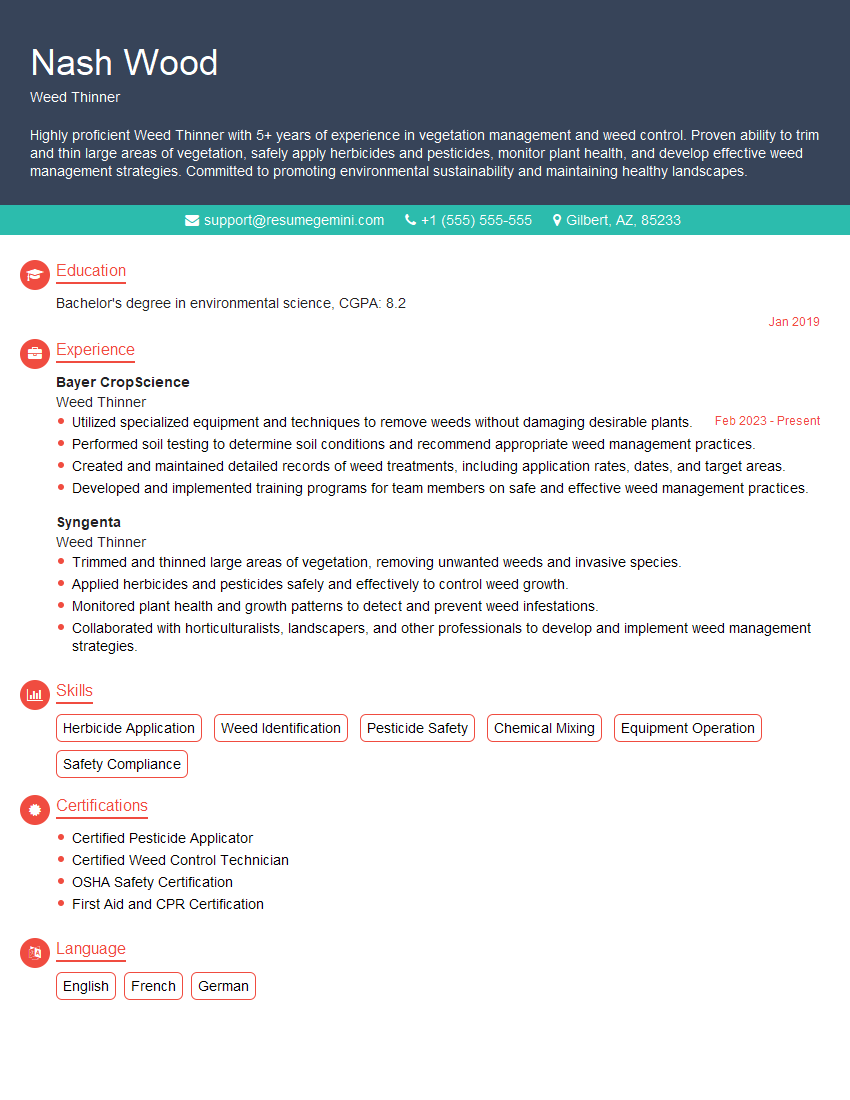Are you a seasoned Weed Thinner seeking a new career path? Discover our professionally built Weed Thinner Resume Template. This time-saving tool provides a solid foundation for your job search. Simply click “Edit Resume” to customize it with your unique experiences and achievements. Customize fonts and colors to match your personal style and increase your chances of landing your dream job. Explore more Resume Templates for additional options.

Nash Wood
Weed Thinner
Summary
Highly proficient Weed Thinner with 5+ years of experience in vegetation management and weed control. Proven ability to trim and thin large areas of vegetation, safely apply herbicides and pesticides, monitor plant health, and develop effective weed management strategies. Committed to promoting environmental sustainability and maintaining healthy landscapes.
Education
Bachelor’s degree in environmental science
January 2019
Skills
- Herbicide Application
- Weed Identification
- Pesticide Safety
- Chemical Mixing
- Equipment Operation
- Safety Compliance
Work Experience
Weed Thinner
- Utilized specialized equipment and techniques to remove weeds without damaging desirable plants.
- Performed soil testing to determine soil conditions and recommend appropriate weed management practices.
- Created and maintained detailed records of weed treatments, including application rates, dates, and target areas.
- Developed and implemented training programs for team members on safe and effective weed management practices.
Weed Thinner
- Trimmed and thinned large areas of vegetation, removing unwanted weeds and invasive species.
- Applied herbicides and pesticides safely and effectively to control weed growth.
- Monitored plant health and growth patterns to detect and prevent weed infestations.
- Collaborated with horticulturalists, landscapers, and other professionals to develop and implement weed management strategies.
Certificates
- Certified Pesticide Applicator
- Certified Weed Control Technician
- OSHA Safety Certification
- First Aid and CPR Certification
Languages
- English
- French
- German
Career Expert Tips:
- Select the ideal resume template to showcase your professional experience effectively.
- Master the art of resume writing to highlight your unique qualifications and achievements.
- Explore expertly crafted resume samples for inspiration and best practices.
- Build your best resume for free this new year with ResumeGemini. Enjoy exclusive discounts on ATS optimized resume templates.
How To Write Resume For Weed Thinner
- Highlight your familiarity with different herbicides and pesticides, and your ability to mix and apply them safely.
- Mention your knowledge of plant identification and your ability to distinguish between desirable and undesirable plants.
- Emphasize your experience in using specialized equipment for weed thinning, such as weed trimmers and sprayers.
- Showcase your commitment to environmental sustainability and your understanding of integrated pest management practices.
Essential Experience Highlights for a Strong Weed Thinner Resume
- Trimmed and thinned large areas of vegetation, removing unwanted weeds and invasive species.
- Applied herbicides and pesticides safely and effectively to control weed growth.
- Monitored plant health and growth patterns to detect and prevent weed infestations.
- Collaborated with horticulturalists, landscapers, and other professionals to develop and implement weed management strategies.
- Utilized specialized equipment and techniques to remove weeds without damaging desirable plants.
- Performed soil testing to determine soil conditions and recommend appropriate weed management practices.
- Created and maintained detailed records of weed treatments.
Frequently Asked Questions (FAQ’s) For Weed Thinner
What are the key skills required to be a successful Weed Thinner?
Successful Weed Thinners possess expertise in herbicide application, weed identification, pesticide safety, chemical mixing, equipment operation, and safety compliance.
What is the average salary for a Weed Thinner?
The average salary for a Weed Thinner varies depending on experience, location, and company size. According to Indeed, the average salary for a Weed Thinner in the United States is $30,000 per year.
What are the career prospects for a Weed Thinner?
Weed Thinners with experience and expertise can advance to supervisory roles, such as Crew Leader or Weed Control Manager. They can also specialize in specific areas of weed management, such as aquatic weed control or invasive species management.
What is the difference between a Weed Thinner and a Landscaper?
While both Weed Thinners and Landscapers work outdoors and maintain plant health, their roles differ. Weed Thinners primarily focus on removing unwanted vegetation and controlling weed growth, while Landscapers design, install, and maintain outdoor spaces, including lawns, gardens, and hardscapes.
What are the safety precautions that Weed Thinners should take?
Weed Thinners must adhere to strict safety protocols when working with herbicides and pesticides. This includes wearing appropriate personal protective equipment, such as gloves, masks, and respirators, and following all label instructions carefully to prevent exposure to hazardous chemicals.
What are the environmental considerations for Weed Thinners?
Weed Thinners play a crucial role in maintaining healthy ecosystems by controlling invasive species and promoting biodiversity. They must prioritize environmentally responsible practices, such as using selective herbicides that minimize harm to non-target organisms and adopting integrated pest management strategies that emphasize non-chemical methods.
What is the role of technology in weed thinning?
Technology advancements are continuously transforming weed thinning practices. GPS-guided equipment enhances precision and efficiency, while remote sensing technologies enable real-time monitoring of weed infestations. Weed Thinners leverage these technologies to optimize their work and minimize environmental impact.
What are the challenges faced by Weed Thinners?
Weed Thinners encounter various challenges, including the emergence of herbicide-resistant weeds, invasive species adaptation, and changing environmental conditions. They must stay updated on industry best practices and research to address these challenges effectively.